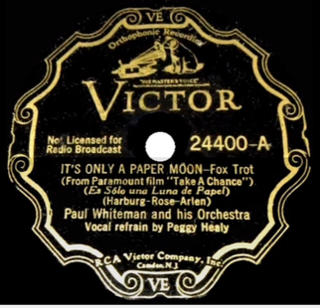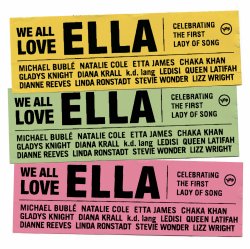
At the Opera House is a 1958 live album by Ella Fitzgerald. The album presents a recording of the 1957 Jazz at the Philharmonic Concerts. This series of live jazz concerts was devised by Fitzgerald's manager Norman Granz; they ran from 1944 to 1983. Featured on this occasion, in 1957, are Fitzgerald and the leading jazz players of the day in an onstage jam session. The first half of the 1990 CD edition includes a performance that was recorded on September 29, 1957, at the Chicago Opera House, whilst the second half highlights the concert recorded on October 7, 1957, at the Shrine Auditorium, in Los Angeles. The original LP obviously included only the mono tracks (#10-18).

Ella Swings Brightly with Nelson is a 1962 studio album by the American jazz singer Ella Fitzgerald, accompanied by an orchestra arranged by Nelson Riddle.

Take Love Easy is an album by the jazz singer Ella Fitzgerald with guitarist Joe Pass, released in 1974.
"They Can't Take That Away from Me" is a 1937 popular song with music by George Gershwin and lyrics by Ira Gershwin. It was introduced by Fred Astaire in the 1937 film Shall We Dance and gained huge success.

Ella Fitzgerald Sings the George and Ira Gershwin Song Book is a box set by American jazz singer Ella Fitzgerald that contains songs by George and Ira Gershwin with arrangements by Nelson Riddle. It was produced by Norman Granz, Fitzgerald's manager and the founder of Verve Records. Fifty-nine songs were recorded in the span of eight months in 1959. It is one of the eight album releases comprising what is possibly Fitzgerald's greatest musical legacy: Ella Fitzgerald Sings The Complete American Songbook, in which she recorded, with top arrangers and musicians, a comprehensive collection of both well-known and obscure songs from the Great American Songbook canon, written by the likes of Cole Porter, Rodgers & Hart, Irving Berlin, Duke Ellington, George and Ira Gershwin, Harold Arlen, Jerome Kern, and Johnny Mercer.

"It's Only a Paper Moon" is a popular song published in 1933 with music by Harold Arlen and lyrics by Yip Harburg and Billy Rose.
"But Not for Me" is a popular song originally written by George Gershwin and Ira Gershwin for the musical Girl Crazy (1930).

"Somebody Loves Me" is a popular song, with music written by George Gershwin, and lyrics by Ballard MacDonald and Buddy DeSylva. The song was published in 1924 and featured in George White's Scandals of 1924.

"Fascinating Rhythm" is a popular song written by George Gershwin in 1924 with lyrics by Ira Gershwin.
"Funny Face" is a 1927 song composed by George Gershwin, with lyrics by Ira Gershwin.

We All Love Ella: Celebrating the First Lady of Song is a 2007 tribute album to Ella Fitzgerald produced by Phil Ramone for Verve Records, released to mark the 90th anniversary of her birth. The "all-star" list of featured vocalists is backed for most part by an orchestra led by Rob Mounsey. The album contains the first release of a duet of Ella Fitzgerald and Stevie Wonder, who joined her on stage with her small band at the New Orleans Jazz and Heritage Festival in 1977.
"My One and Only" is a song composed by George Gershwin, with lyrics by Ira Gershwin, written for the 1927 musical Funny Face where it was introduced by Fred Astaire, Betty Compton and Gertrude McDonald. It was originally titled "(What Am I Gonna Do) If You Turn Me Down?"
"(I've Got) Beginner's Luck" is a song composed by George Gershwin, with lyrics by Ira Gershwin, written for the 1937 film Shall We Dance, it was introduced by Fred Astaire. It is a brief comic tap solo with cane where Astaire's rehearsing to a record of the number is cut short when the record gets stuck. Astaire's commercial recording for Brunswick was very popular in 1937.
"'The Half of it, Dearie' Blues" is a song composed by George Gershwin, with lyrics by Ira Gershwin. It was introduced by Fred Astaire and Kathlene Martyn in the 1924 musical Lady be Good.
"That Certain Feeling" is a 1925 song composed by George Gershwin, with lyrics by Ira Gershwin.
"Who Cares?" is a song composed by George Gershwin, with lyrics by Ira Gershwin, written for their 1931 musical Of Thee I Sing. It was introduced by William Gaxton and Lois Moran in the original Broadway production.
Alvin Stoller was an American jazz drummer. Though he seems to have been largely forgotten, he was held in high regard in the 1940s and 1950s. He was best known for playing drums on both Mitch Miller's recording of "The Yellow Rose of Texas" and Stan Freberg's parody of Miller's recording.

Swing jazz emerged as a dominant form in American music, in which some virtuoso soloists became as famous as the band leaders. Key figures in developing the "big" jazz band included bandleaders and arrangers Count Basie, Cab Calloway, Jimmy and Tommy Dorsey, Duke Ellington, Benny Goodman, Fletcher Henderson, Earl Hines, Glenn Miller, and Artie Shaw. Duke Ellington and his band members composed numerous swing era hits that have become standards: "It Don't Mean a Thing " (1932), "Sophisticated Lady" (1933) and "Caravan" (1936), among others. Other influential bandleaders of this period were Benny Goodman and Count Basie.








